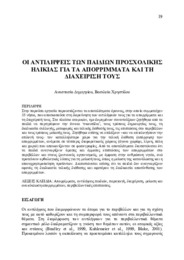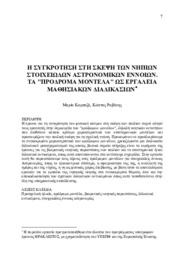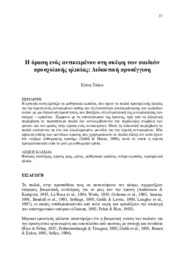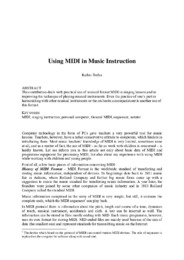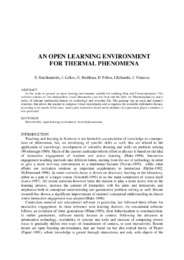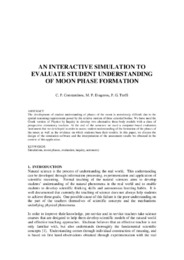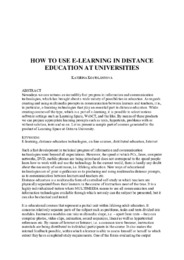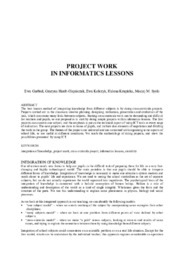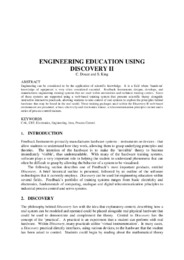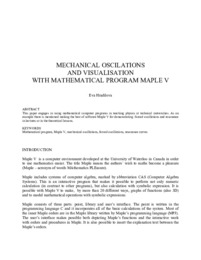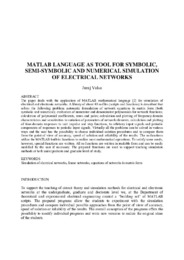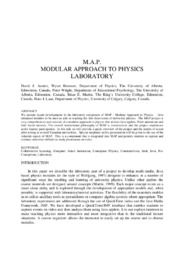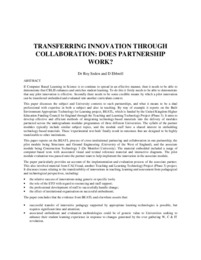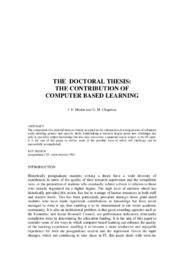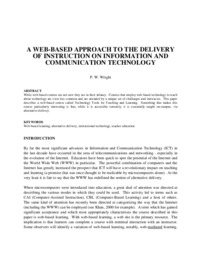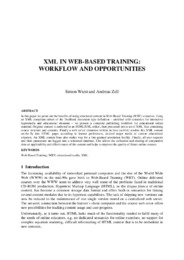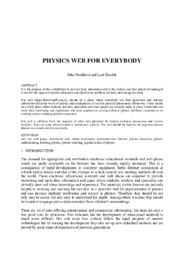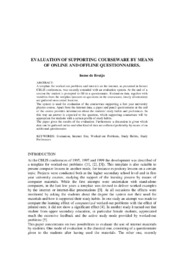Κυπριακή ερευνητική παραγωγή / Cyprus research production: Recent submissions
Now showing items 121-140 of 682
-
Οι αντιλήψεις των παιδιών προσχολικής ηλικίας για τα απορρίμματα και τη διαχείρισή τους
(Πανεπιστήμιο Κύπρου; University of Cyprus, 2004)Στην παρούσα εργασία παρουσιάζονται τα αποτελέσματα έρευνας, στην οποία συμμετείχαν 35 νήπια, που αποσκοπούσε στη διερεύνηση των αντιλήψεών τους για τα απορρίμματα και τη διαχείρισή τους. Στο πλαίσιο ατομικών, ημι-δομημένων ... -
Η συγκρότηση στη σκέψη των νηπίων στοιχειωδών αστρονομικών εννοιών. Τα "πρόδρομα μοντέλα" ως εργαλεία μαθησιακών διαδικασιών
(Πανεπιστήμιο Κύπρου; University of Cyprus, 2004)Η έρευνα για τη συγκρότηση του φυσικού κόσμου στη σκέψη των παιδιών συχνά οδηγεί τους ερευνητές στην δημιουργία των "πρόδρομων μοντέλων", δηλαδή νοητικών οντοτήτων που διαθέτουν κάποια κρίσιμα χαρακτηριστικά των επιστημονικών ... -
Η όραση ενός αντικειμένου στη σκέψη των παιδιών προσχολικής ηλικίας: διδακτική προσέγγιση
(Πανεπιστήμιο Κύπρου; University of Cyprus, 2004)Η εργασία αυτή εξετάζει τα μαθησιακά εμπόδια, που έχουν τα παιδιά προσχολικής ηλικίας για την όραση ενός αντικειμένου καθώς και τη δυνατότητα αναδιοργάνωσης των εμποδίων αυτών με μια διδακτική προσέγγιση, που βασίζεται στη ... -
The development of modeling skills through computer based simulation of an ant colony
(Pedagogical Faculty of University of Ostrava, 2001)Learning in science can be analyzed into a number of constituent components: the acquisition of experiences with natural phenomena provides the basis for the subsequent development of concepts; the mental representation ... -
Using midi in music instruction
(Pedagogical Faculty of University of Ostrava, 2001)The contribution deals with practical use of musical format MIDI in singing lessons and in improving the technique of playing musical instruments. Even the practice of one s part in harmonizing with other musical instruments ... -
An open learning environment for thermal phenomena
(Pedagogical Faculty of University of Ostrava, 2001)In this work we present an open learning environment, suitable for teaching Heat and Thermodynamics. The software consists of two independent visual laboratories (one for Heat and the other for Thermodynamics) and a series ... -
An interactive simulation to evaluate student understanding of moon phase formation
(Pedagogical Faculty of University of Ostrava, 2001)The development of student understanding of phases of the moon is notoriously difficult due to the spatial reasoning requirements posed by the relative motion of three celestial bodies. We have used the Greek version of ... -
How to use e-learning in distance education at Universities
(Pedagogical Faculty of University of Ostrava, 2001)Nowadays we can witness an incredibly fast progress in information and communication technologies, which has brought about a wide variety of possibilities in education. As regards creating and using multimedia prompts in ... -
Project work in informatics lessons
(Pedagogical Faculty of University of Ostrava, 2001)The best known method of integrating knowledge from different subjects is by doing cross-curricula projects. Projects carried out in the classroom involve planning, designing, realisation, presentation and evaluation of ... -
Engineering education using Discovery II
(Pedagogical Faculty of University of Ostrava, 2001)Engineering can be considered to be the application of scientific knowledge. It is a field where ‘hands-on’ knowledge of equipment is very often considered essential. Feedback Instruments designs, develops, and manufactures ... -
Mechanical oscilations and visualisation with mathematical program maple v
(Pedagogical Faculty of University of Ostrava, 2001)This paper engages in using mathematical computer programs in teaching physics at technical universities. As an example there is mentioned making the best of software Maple V for demonstrating forced oscillations and ... -
Using of tips programs packages in engineering education
(Pedagogical Faculty of University of Ostrava, 2001)One of the tasks of higher school is to teach students for creative work. This task equally concerns both to students of natural sciences specialities, and the pupil – “humanities”. In this report the main features of the ... -
Matlab language as tool for symbolic, semi-symbolic and numerical simulation of electrical networks
(Pedagogical Faculty of University of Ostrava, 2001)The paper deals with the application of MATLAB mathematical language [2] for simulation of electrical and electronic networks. A library of about 40 m-files (scripts and functions) is described that solves the following ... -
M.A.P. modular approach to physics Laboratory
(Pedagogical Faculty of University of Ostrava, 2001)We present recent developments in the laboratory component of MAP - Modular Approach to Physics - Java enhanced modules to be used as aids in teaching the first three terms of university physics. The MAP project is very ... -
Transferring innovation through Collaboration: does partnership Work?
(Pedagogical Faculty of University of Ostrava, 2001)If Computer Based Learning in Science is to continue to spread in an effective manner, then it needs to be able to demonstrate that CBLIS enhances and enriches student learning. To do this it firstly needs to be able to ... -
The doctoral thesis: the contribution of computer based learning
(Pedagogical Faculty of University of Ostrava, 2001)The completion of a doctoral thesis is widely accepted as the culmination of a long process of advanced study entailing generic and specific skills. Undertaking a research degree poses new challenges not only in specialist ... -
A web-based approach to the delivery of instruction on information and Communication technology
(Pedagogical Faculty of University of Ostrava, 2001)While web-based courses are not new they are in their infancy. Courses that employ web-based technology to teach about technology are even less common and are attended by a unique set of challenges and intricacies. This ... -
XML in web-based training: Workflow and opportunities
(Pedagogical Faculty of University of Ostrava, 2001)In this paper we point out the benefits of using structured content in Web-Based Training (WBT) scenarios. Using an XML compliant subset of the DocBook document type definition – enriched with semantics for interactive hypermedia ... -
Physics web for everybody
(Pedagogical Faculty of University of Ostrava, 2001)It is the purpose of this contribution to provide basic information about the creation and first period of running of a web for the support of physics education and about some problems we have met during this work. Our web ... -
Evaluation of supporting courseware by means of online and offline questionnaires
(Pedagogical Faculty of University of Ostrava, 2001)A template for worked out problems and tutorials on the internet, as presented in former CBLIS conferences, was recently extended with an evaluation system. At the end of a session the student is prompted to fill in a ...
